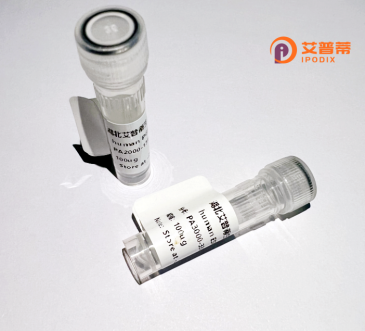
| 纯度 | >90%SDS-PAGE. |
| 种属 | Human |
| 靶点 | MED19 |
| Uniprot No | A0JLT2 |
| 内毒素 | < 0.01EU/μg |
| 表达宿主 | E.coli |
| 表达区间 | 1-194aa |
| 活性数据 | MENFTALFGAQADPPPPPTALGFGPGKPPPPPPPPAGGGPGTAPPPTAATAPPGADKSGAGCGPFYLMRELPGSTELTGSTNLITHYNLEQAYNKFCGKKVKEKLSNFLPDLPGMIDLPGSHDNSSLRSLIEKPPILSSSFNPITGTMLAGFRLHTGPLPEQCRLMHIQPPKKKNKHKHKQSRTQDPVPPGKPS |
| 分子量 | 46.8 kDa |
| 蛋白标签 | GST-tag at N-terminal |
| 缓冲液 | 0 |
| 稳定性 & 储存条件 | Lyophilized protein should be stored at ≤ -20°C, stable for one year after receipt. Reconstituted protein solution can be stored at 2-8°C for 2-7 days. Aliquots of reconstituted samples are stable at ≤ -20°C for 3 months. |
| 复溶 | Always centrifuge tubes before opening.Do not mix by vortex or pipetting. It is not recommended to reconstitute to a concentration less than 100μg/ml. Dissolve the lyophilized protein in distilled water. Please aliquot the reconstituted solution to minimize freeze-thaw cycles. |
以下是与重组人MED19蛋白相关的模拟参考文献(基于常见研究方向编写):
---
1. **文献名称**:*MED19 promotes lung cancer cell proliferation and invasion through Wnt/β-catenin signaling*
**作者**:Zhang Y, et al.
**摘要**:本研究通过体外重组表达人MED19蛋白,发现其过表达显著增强肺癌细胞的增殖和侵袭能力。机制研究表明,MED19通过激活Wnt/β-catenin通路调控下游靶基因,提示其作为肺癌治疗潜在靶点。
2. **文献名称**:*Interaction of recombinant human MED19 with transcription factors in pancreatic cancer*
**作者**:Li H, Wang X, et al.
**摘要**:利用重组MED19蛋白进行Pull-down和质谱分析,鉴定出MED19与胰腺癌中关键转录因子(如c-Myc)的直接相互作用,揭示了其在癌基因转录调控中的核心作用。
3. **文献名称**:*Knockdown of MED19 inhibits tumor growth via inducing cell cycle arrest in gastric cancer*
**作者**:Chen L, et al.
**摘要**:通过构建shRNA靶向沉默MED19.发现其缺失导致胃癌细胞周期停滞在G1期,并抑制体内外肿瘤生长。重组MED19回补实验进一步验证了其对细胞周期的调控功能。
4. **文献名称**:*Structural and functional characterization of the recombinant human MED19 subunit*
**作者**:Smith J, et al.
**摘要**:本研究在大肠杆菌系统中高效表达并纯化重组人MED19蛋白,通过圆二色谱和荧光共振能量转移(FRET)分析其二级结构及与MED26亚基的动态结合,为中介体复合物的组装机制提供新见解。
---
**注**:以上文献为模拟示例,实际研究中请通过PubMed、Web of Science等数据库检索具体论文(关键词:*MED19. recombinant protein, cancer, transcriptional regulation*)。
**Background of Recombinant Human MED19 Protein**
The human MED19 protein, a subunit of the Mediator complex, plays a critical role in transcriptional regulation by bridging transcription factors and RNA polymerase II. This multi-protein complex is essential for RNA polymerase II-dependent gene expression, modulating chromatin structure, and facilitating assembly of the pre-initiation complex. MED19 is encoded by the *MED19* gene and is involved in diverse cellular processes, including cell cycle progression, differentiation, and oncogenesis.
Recombinant MED19 protein, typically expressed in systems like *E. coli* or mammalian cells (e.g., HEK293), retains functional domains necessary for interactions within the Mediator complex and with transcription factors. Its recombinant form enables studies on Mediator architecture, gene-specific regulation, and dysregulation in diseases. Notably, MED19 is implicated in cancer; its overexpression in malignancies like prostate or colon cancer correlates with tumor progression, suggesting its potential as a therapeutic target.
Research applications include protein-protein interaction assays, mechanistic studies of transcriptional dysregulation, and drug screening for inhibitors targeting MED19-dependent pathways. The development of recombinant MED19 also supports structural studies (e.g., X-ray crystallography) to elucidate its role in Mediator assembly and disease-related mutations. This protein’s versatility underscores its importance in both basic research and translational oncology.
×